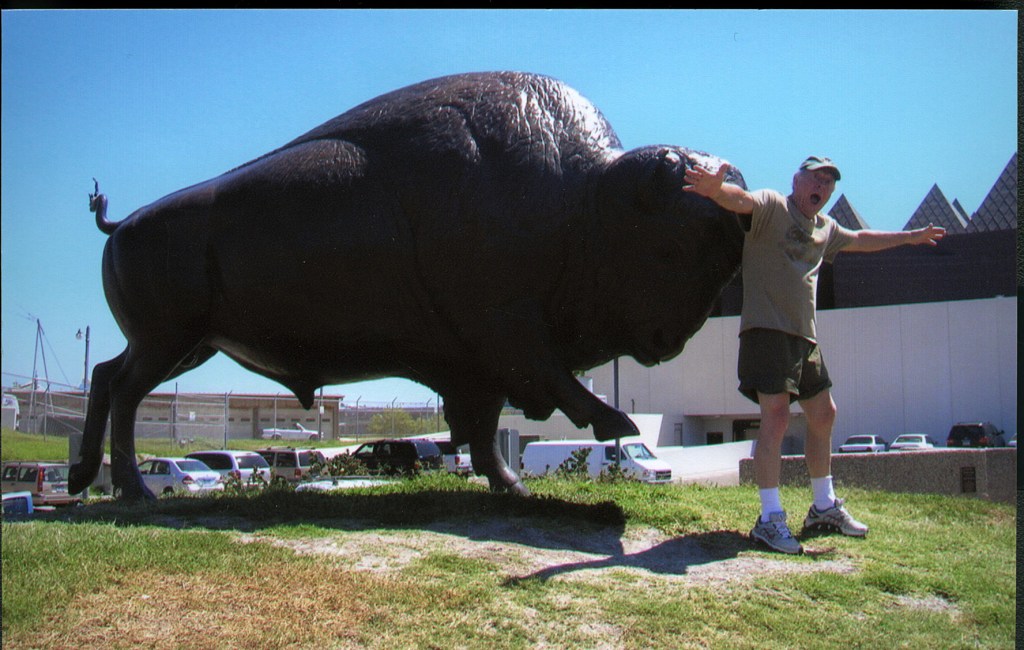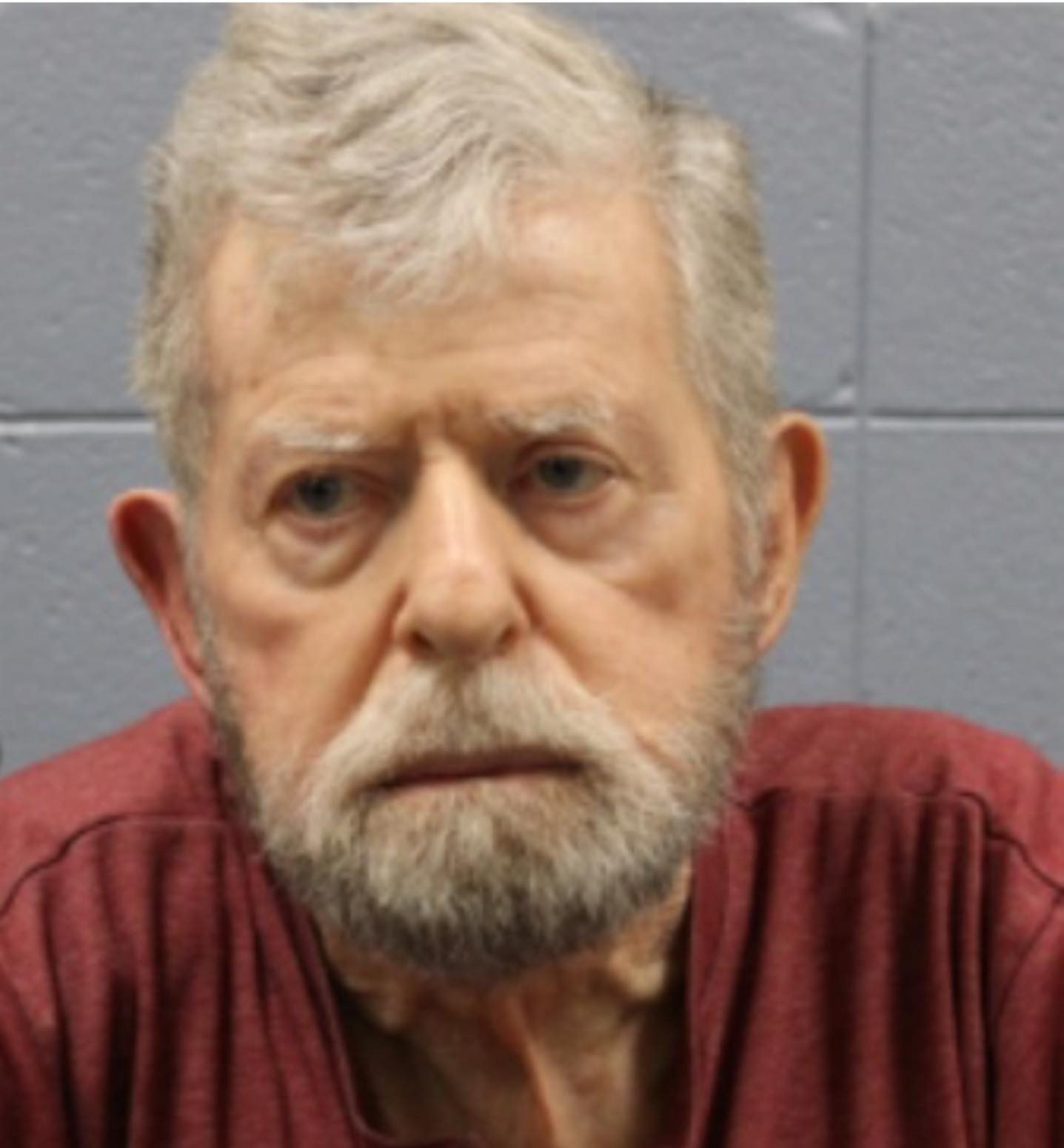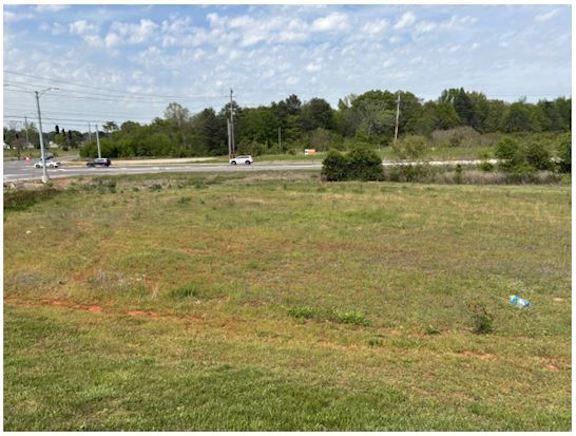The lure of the open road leads to Texas Hill Country
Published 8:23 am Friday, June 4, 2010

- Jerry Barksdale being trampled by a marauding buffalo in Corpus Christi proves that everything is bigger in Texas — even imaginations.
Too many days in divorce court had made me squirrelly. The road beckoned. I love the freedom of traveling down a highway, and when I listen carefully to the tires crossing the cracks, I can almost hear them say “freedom … freedom … freedom.”
Trending
I once drove 1,200 miles to Colorado Springs, where I spent the night, ate breakfast and returned home. There is always something interesting around the next bend in the road. I’ll never forget years ago when I crested a hill in eastern New Mexico and saw the snow-capped Rockies for the first time.
I decided to drive to Texas Hill Country, not only to see the wildflowers in bloom, but to locate the gravesite of Uncle Emmit Barksdale who left Limestone County in the 1880s and settled near Buda. Grandpa Barksdale joined him and they worked on a cattle drive, but Grandpa returned home and married Ada Isom in 1896.
I kicked the tires on my pickup, checked the oil stick and filled the tank and was set to leave at daylight with a mug of hot coffee and listening to Willie Nelson. But no western adventure is worth telling if it doesn’t have drama. I needed a sidekick. After all, Roy Rogers had Gabby Hayes and Gene Autry had Frog Millpond. I invited my friend Pat. I knew that I could count on her to use up the bath towels, take 10 minutes to find the room key in her 10-pound purse and ask to stop at every shoe store in Texas. Perfect!
We decided to fly the 1,200 miles to San Antonio instead of driving, departing Birmingham Saturday morning via Memphis and arriving in plenty of time to visit the Alamo and explore Riverwalk.
After tornadoes were spotted in Memphis, we were routed to Atlanta and didn’t arrive in San Antonio until near midnight. I promptly got lost downtown in a pint-sized Mazda rental. Great start.
Sunday morning we drove north beneath a wide blue sky on U.S. 281, which narrows to a two-lane ribbon of gray bordered by lush patches of wild blue belles, Indian paintbrush and black-eyed Susans. We stopped at tiny Blanco where a brown limestone Victorian style courthouse erected in 1886 and vacated four years later stands in the center of a few antique shops and vacant buildings. Texans aren’t bashful about their patriotism. Numerous U.S. and Lone Star flags snapped stiffly in the ever-present wind.
Trending
Sharon Denard, proprietor of Cranberry’s Antiques, has deep roots in Texas Hill Country, her ancestors having arrived in the area from Germany in the 1850s.
“My fifth generation grandfather was the first white settler of Jackson County, Texas, which made my fourth great grandfather the first child born to Anglo settlers west of the Colorado River,” she told us.
Across the street at Carousel Antiques I met Joan Bindseil, a friendly lady wearing turquoise and silver jewelry who raises a breed of dogs I’d never heard of.
“Baruken Inca Orcan hounds,” she said.
“Huh?”
“They are rare hairless dogs from Peru.”
My kind of mutt, I thought. Big savings on flea collars and grooming.
I learned that filming is about to begin at the old courthouse on a remake of True Grit, starring Jeff Bridges as Rooster Cogburn.
Luchenbach, Texas
I met an interesting fellow sporting a western mustache who said his ancestors had fought with Gen. Sam Houston. When I produced a tape recorder he dried up.
“I don’t talk to tape recorders,” he said, eyes narrowing.
Maybe he thought I was a PI hired by his ex, I don’t know.
The 16-mile drive to Luckenbach (population 3) was on a narrow blacktop bordered by wildflowers that snaked through scrub oaks and mesquite covered hills. I crossed Grape Creek, blinked and almost missed the bumper sticker size sign. Turning onto a narrow dirt road shaded by 500-year-old live oaks, I drove downtown to a ramshackle, cracker box building used as a combination post office, general store and beer joint.
Behind the building was a small stage where a band played. In front was an ancient well casing on which a Rhode Island Red Rooster perched, crowing at intervals. A dance hall was across the street.
While observing a cowboy riding a Volkswagen-sized Longhorn, I carefully threaded my way through a herd of parked motorcycles, praying that I wouldn’t knock one over and start a domino effect. I didn’t figure the wimpy Mazda could outrun a hundred Harleys back to Alabama.
Luckenbach was purchased by Hondo Crouch and friends in 1970 and made famous by Willie and Waylon’s massive hit, “Luckenbach, Texas.” Hondo, a cowboy folk hero, proclaimed himself mayor and immediately appointed ambassadors to foreign countries, sponsored a World’s Fair, Mud Daubers Festival, Hug-Ins and a Ladies State Chili Bust and announced that in Luckenbach, “Everybody’s somebody.”
I was seated on the front porch enjoying the shade when a fellow holding a beer and wearing a Harley shirt and red bandana walked up. Mike was his name. We talked.
“I wanted to retire in a place I could grow a palm tree — live in a climate that’s not so cold,” he said. He likes the laid back attitude. “I would say that this area has as much human freedom as can be found in America.”
He was building a “barndominium.”
“It’s a metal building on a slab with no roll-up doors, just walk-in door and windows and converted on the inside to living quarters.”
Mike was talkative.
“My girlfriend of 25 years kicked me out last year. She found another man — Jesus Christ.”
“Well, you probably won’t beat his time.” I said.
“Yeah, I know,” he swigged his beer.
Tex-Mex attack
That afternoon we drove 10 miles up the road to Fredericksburg, a neat, clean town, settled by German immigrants. Admiral Chester Nimitz of World War II fame was born there. Old native brownstones lined the main street where grackles fussed loudly in the shade trees.
I couldn’t wait to dive into a bowl of Tex-Mex food. Unfortunately, I ordered a chicken burrito and a bowl of beans that turned out to be miniature hand grenades with time- delayed fuses. No more Tex-Mex for me.
While Pat shopped, I toured the National Museum of the Pacific War. Each of the 36 rooms of the museum tells a story, beginning with the rise of Japanese power and ending with an atomic bomb being dropped on Hiroshima. It was well worth the $8, but I should have scheduled a half a day.
LBJ’s digs
Down the road at little, bittie Stonewall on the Perdernales River we pulled in at the LBJ Ranch, which served as the Western White House from 1963-1968. The Presidential Office reminded me of my own pad. A gaudy saddle was displayed near the entrance and large color photos of Him and Her, LBJ’s Beagle hounds, hung near his desk.
A pillow embroidered with, “This is my ranch and I’ll damn well do as I please,” rested in his easy chair. My spirits were lifted when I learned that LBJ guzzled from one to two fifths of scotch daily. It made me feel superior that I drink only one shot a day.
Sometimes happiness comes unexpectedly. According to the guide, LBJ was light years ahead of his time in communications. There were three TVs in the living room, each tuned to a different network. In the dining room a phone was located at the head of the table, which LBJ held in his left hand talking while shoveling food into his mouth with his right hand, simultaneously spraying food particles on his guest. I wasn’t impressed. I know a lot of just plain Crackers who can do that.
Downtown Buda consists of a single street lined mostly with quaint old buildings facing railroad tracks. I stood beneath blue skies near the single traffic light and looked down Main Street where cattle were once herded north to market in Abilene and imagined Grandpa and Uncle Emmit riding drag and eating dust.
No Uncle Emmit
“I’m going over to City Hall and get a map to locate the cemeteries,” I said to Pat.
“While you’re doing that I’m going in this little shop,” she said, pointing.
After obtaining a map designating the six cemeteries in the area, I trotted across the street to the car. No Pat! Reasoning that she would be occupied for a while, I drove to the nearest cemetery. I figured that leaving her in the shoe shop was like throwing Brer Rabbit in a briar patch. My cell phone rang. “Where are you?” she asked.
“Looking for Allen Good Cemetery, why?”
“You left me!”
I’ll never understand women.
I placed her in charge of navigation. We waded through tall weeds and grass in unkempt cemeteries, one eye always peeled for rattlesnakes, searching for the gravesite, but to no avail. I fumed. To show my gratitude I promoted Pat on the spot.
“Tell me when I’ve reached the top,” she said.
After spending a half-day helping me, my cup was brimming over with gratitude toward her. “I’m promoting you to Honorary Texas Ranger.”
“Now, have I reached the top?”
“Yep.”
After that promotion, I think she forgave me for abandoning her in the shop. We headed south to Corpus Christi.
The landscape levels out toward the Gulf of Mexico, and the soil is black and fertile, planted with corn for miles. Large oil refineries puffing white smoke loomed on the horizon. Palm trees, live oaks, and blooming oleanders were plentiful in this quiet city by the sea. We checked in at the Holiday Inn on the beach.
“Beautiful, clean city you have,” I said to a young Hispanic woman at the front desk.
“Too small for me. I’m moving to Chicago.”
The wind blew all night through the open sliding doors and the surf pounded. Next morning Pat and I walked along the beach; saw the battleship USS Lexington tied to the dock but decided not to visit it. I talked to a shrimper standing on the back of a rusty, old boat hawking his catch. He was worried.
“I don’t think the oil spill will reach us,” he said, doubt in his voice. “But if it does, we’re outta business. Don’t know what I’ll do.”
“Good luck,” I said.
Pat was having SunDrop withdrawals, and there wasn’t a can to be purchased in Texas.
“When I get home I’m going to drink a whole case,” she groused.
Remember the Alamo
We were reluctant to leave Corpus Christi, but King Ranch beckoned. I needed gas before taking the long stretch of road to Kingsville. Oil refineries surrounded us but no gas at the pumps. I was biting my nails when I finally found gas north of the city.
King Ranch, larger than Rhode Island, was founded in 1853 by Richard King, an Irish immigrant who grew wealthy during the Civil War trading cattle for Southern cotton, which he shipped to England. The 825,000-acre spread is home for 50,000 cattle and 350 Quarter horses. During the two-hour tour I kept saying “Golllleee!”
King, who knew nothing of ranching, traveled to Mexico and purchased all of the cattle in a poor village. Realizing the citizens would have no income, he invited them to Texas, and many of the current employees are descendants of those original villagers.
Back in San Antonio, Pat went shopping and I hurried to the Alamo. Two Alabamians and 32 Tennesseans died there. Hoards of rambunctious elementary school children, hopping around like grasshoppers, had been bused in to tour the memorial and afterwards see the Imax film “Alamo: The Price of Freedom.” I dreaded the experience but was in for a surprise. The lights went down, the children grew quiet, and when the film ended I witnessed something I hadn’t experienced since childhood. They clapped and cheered.
We checked our baggage at the airport for the return trip. My suitcase had gained five pounds and Pat’s looked like it was about to give birth.
“Lady, you sure got a lotta stuff,” said the handler.
She fumed, “He’s not my mother.”
I didn’t locate Uncle Emmit’s grave, but I learned something on the trip: Life won’t wait, so enjoy it now. The men who fought at the Alamo didn’t want to die; they wanted to live free. Never underestimate children. I still don’t know a darn thing about women, but shoe stores and SunDrops have a calming effect on some of them. Texas is a whole ‘nother place, and I predict it will never amount to much. It’s just too big.
But what do I know?“





